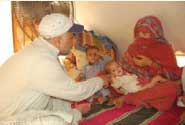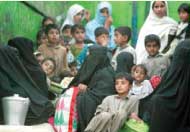Islamic Relief to the Rescue
 Habib Malik of Islamic Relief with Noor Bibi and her
children in their tent
Habib Malik of Islamic Relief with Noor Bibi and her
children in their tent |
Noor Bibi was having what she called a “normal” day at home with her seven children when fighting erupted in her village in Swat, Pakistan.
“It was so sudden I did not know what to do,” Noor Bibi, 35, told an Islamic Relief field worker. “My main concern was my children.”
Carrying her infant son, Bibi gathered her family members and fled, with nothing more than the clothes they were wearing.
In the commotion, a piece of shrapnel struck Bibi’s leg, injuring it severely.
“It started to bleed badly, but there was no way I could get any medical treatment,” Bibi recalled.
Neighbors helped Bibi and her children reach a government-run camp in the neighboring village where she received medical attention, but Bibi noticed that her family was not complete.
Her husband and nine-year-old daughter, Shakira, were missing.
She informed camp officials who told her that her husband had registered and was safe in the same camp. Her daughter was still missing, however.
“We have no idea where and in what condition she is,” Bibi told an Islamic Relief field worker. “I can’t wait to see her, not having her around is more painful than the injury.”
There are many stories just like Bibi’s being told in Pakistan today.
Habib Malik, an Islamic Relief staff member visiting the camps, reported: “ One ten-year-old boy I met was in the camp on his own. He had been separated from his family in the chaos as everyone fled from his village and has not seen them since.”
“Unfortunately, his story is not unique,” Malik said.
Dire Situation
 A group of displaced women and children
A group of displaced women and children |
Islamic Relief field workers have reported widespread suffering amongst many of the nearly two million people, about 80 percent of whom are women and children, who are seeking assistance after being displaced by fighting in the Swat valley of Pakistan’s North West Frontier Province.
Internally displaced persons (IDPs) are facing widespread shortages of food, clean water and sanitation facilities as thousands continue to pour into the already overcrowded camps.
“There are shortages of food in the camps and I saw lines of men who had been queuing for hours since after morning prayers for rations of food. All of them looked defeated and desperate,” Malik said.
“The children all said that they wanted to go back to school, but that is simply not possible. They want to lead a normal life, to play, and to dream about becoming doctors and teachers. But nothing is normal at the moment and this is adding to the trauma that many are experiencing,” he added.
Islamic Relief’s Response
Responding to the crisis, Islamic Relief USA launched a $750,000 emergency fundraising appeal to help those who are without food, water or shelter in the NWFP.
On the ground, Islamic Relief has deployed assessment teams to survey the people's needs and is working closely with the local communities to maximize efficiency. Assessment teams have submitted their initial report and proposed to provide three months of emergency support to 70,000 beneficiaries in the Mardan and Swabi districts.
Assistance will include the provision of emergency aid such as blankets, clothing and cooking sets, supplies of clean water, and psychosocial support for traumatized children. The public is strongly urged to offer their support to victims by donating to Islamic Relief USA.
“There is nothing like home and we cannot wait to be back home where we can live the way we used to,” Bibi said. “This way of life is very tough and we are not comfortable with it at all.”
Please support Islamic Relief’s efforts to help Pakistan’s suffering IDPs and donate today.
On the web, www.irw.org
Toll-free: (888) 479 – 4968
Islamic Relief USA
P.O. Box 5640
Buena Park, CA 90622
-------------------------------------------------------------------------------------

